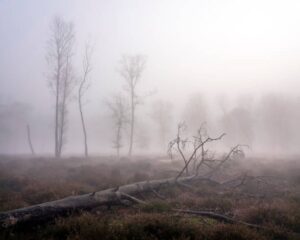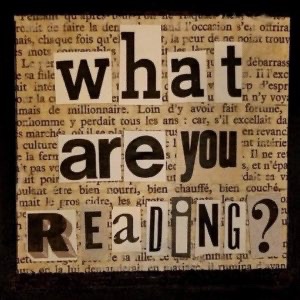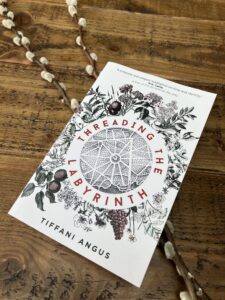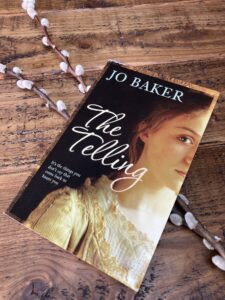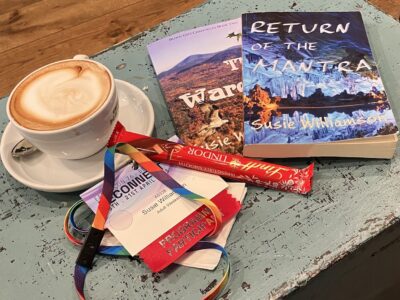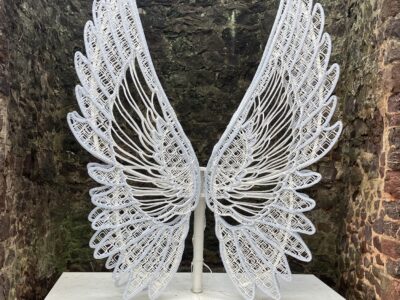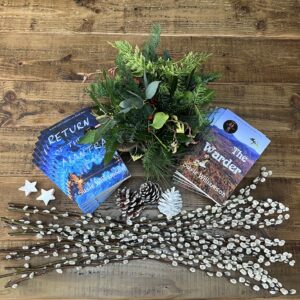
Stopping by to wish everyone Seasons Greetings & Happy Holidays, and to offer a huge thanks to all of my readers of Blood Gift Chronicles, for your continued support and enjoyment of my beloved characters in Return of the Mantra, and The Warder.
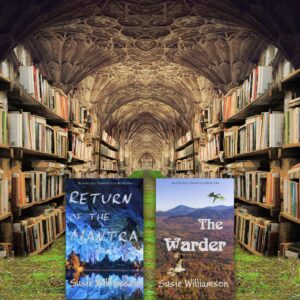
And as Xmas approaches, along with seasonal traditions of jolabokaflod, as a writer and an avid reader I am once again reminded that stories are a gift.
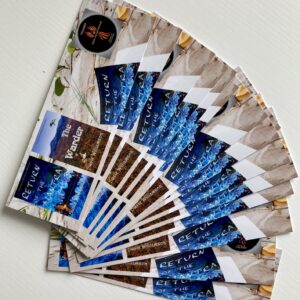
To that end, I offer a short story of mine, entitled Moorbrooke; a ghost story set on the misty moors for those who enjoy an atmospheric haunting. Moorbrooke was recently published in audio, by The Other Stories. To listen to the audio version, click here.
Moorbrooke
By Susie Williamson
Deep in the heart of Dartmoor, John is a guilty man. As the mist closes in, he wonders, will he escape retribution?
***
John stared at his reflection in the hallway mirror. Cool grey eyes looked back. He hadn’t meant to kill her, he told himself with an affirming nod.
There was an expected knock at the door. The estate agent was on time. John would be glad to sell Moorbrooke and get back to civilisation. He brushed a hand back through his hair, straightened his collar, fixed a smile on his face, and opened the door. There was no one there.
‘Hello,’ John called. No answer.
He stepped outside and called again, wondering how the mist had rolled in without him noticing. There was still no answer and no sign of a car in the yard. He rubbed his arms, feeling the October chill, and paused, seeing a card blowing across the ground, landing at his feet. He bent down and picked it up, gritting his teeth at the sight of the tarot card’s picture of Justice. He looked out across the yard, towards moorland part-hidden in the misty haze. A lone, hooded figure stood beyond the gate. It was Hannah’s witch-friend, Sue. He clenched his fist, screwing the card up in his hand, then turned and headed back into the cottage.
The lounge door was ajar. John was sure he had closed it. He paused, confused by the sight of green-swirled threadbare carpet showing through the open doorway. He stepped towards it and placed a hand on the door. When he pushed it open, everything was as it should be: polished wood flooring with a cream woollen rug by the fireplace. He stopped to gather himself. He was just imagining things. He went in and opened the door of the wood burner, placed a log on the dying fire, and watched with satisfaction as the flames took hold. He dropped the screwed-up tarot card into the fire, closed the door, then went to the window. Sue was still there, watching the cottage, her face framed by the furry parka hood. John looked back, until her outline disappeared as mist turned to fog. He sighed at the thought that the roads would be impassable. A remote life on Dartmoor had been his idea, and he’d enjoyed it while it lasted, but the moor’s temperamental weather was something he wouldn’t be sad to leave behind.
He went into the kitchen to make a start on dinner, glad he’d done a week’s shop only the day before. While browning chicken, he diced an onion, so strong it made his eyes smart. He wiped the tears blurring his eyes, picked up a carrot and started to chop. Feeling a sudden chill at his back, his concentration faltered. The knife slipped, cutting into his finger. He winced, pausing at the sight of pooling blood, then went to the sink to wash his hand. Once a plaster was firmly in place, he turned and paused mid-stride. The tarot card, with edges still smouldering, lay on the chopping board. His heart was racing as he picked up the card and headed back to the lounge. Passing the hallway, he saw the front door was open ajar. He went to it and stood leaning out of the doorway.
‘Stay away from my house, you fucking witch!’ he yelled into the fog.
He slammed the door and locked it, then went into the lounge, placed another log on the fire, and watched the tarot card burn.
Once dinner was cooking in the oven, John returned to the lounge and settled down in the armchair, answering a call from the estate agent who confirmed they would try to visit the next day. The call ended and John paused, eyes fixed on the painting on the wall: an autumnal Dartmoor landscape painted by his dead girlfriend, Hannah. He slowly stood and cracked his knuckles. With teeth clenched, he went to the painting and lifted it down from the wall. He hadn’t allowed Hannah’s trash in the house when she was alive, he sure as hell wouldn’t have them on the wall now that she was dead. But just how was that bitch, Sue, doing this.
In the hallway he put on his coat and headed out to the back of the house, one arm clutching the painting, one arm held out in front as he struggled to see in the thick fog. Inching his way to the garage, he reached the old wooden door, fiddled with the key in the lock until the rusty padlock gave way. He pulled the door open, clicked on the drawstring light that bathed the room in a sickly yellow glow. Hannah’s paintings were stacked beneath a clear plastic sheet that offered little protection from encroaching damp: various moorland scenes and nearby towns with moody tones of blue, grey and brown. John dropped the painting on top of the pile, and glanced across at Hannah’s old workbench. It might be cold and damp but it was a place of her own to work: she always had been ungrateful. He was about to leave but reconsidered, stopping to tuck the painting under the sheeting along with the rest.
Back inside, he ate dinner, sucking the chicken bones clean, then settled in the armchair sipping Jack Daniels, staring at the empty picture hook where Hannah’s painting had been. Why couldn’t he remember what had been hanging there? He didn’t remember feeling sleepy or seeing the sky outside turn dark. The next thing he knew, he was waking up in the chair with morning sun shining in at the window. He stretched his stiff arms, rubbed the back of his neck, and slowly stood. After a morning pot of tea, he opened the front door, surprised by how warm it was and relieved to see no sign of any mist. The estate agent would surely make it out today, but first, a walk and some fresh air.
John headed out across the yard, through the gate, and over moorland, towards nearby Rowtor, nestled among the red/golden glow of turning leaves and fading ferns. The distant sound of chattering, chirping, flocking birds approached, bringing the sky to life. He gazed up at the pink tinged sky, blossoming with rosy hues, surprised to see the starling murmuration so early in the day. Mesmerised by the kaleidoscope of flowing, shifting, mushrooming waves, a perfect balance of unity, in comparison, he felt strangely disconnected. It was a thought that stayed with him as he trekked up to the Tor, wondering at the distance between body and mind. Reaching the granite top, he lay a hand on the cold stone, but felt the ground shift beneath his feet. He stepped back, and watched something push up through the grass: it was a bone, perhaps a humerus or femur, that came to rest at his feet. The ground stirred all around, and John knew where to look. He had chopped up Hannah’s body as easily as he would dice a chicken, and discarded her bones in shallow graves across the moor; a suitable meal for passing scavengers.
John was awoken by a sudden thump. He sat up with a start, and stared at the window to see a dead starling slumped against the pane. He rubbed his eyes, feeling his skin doused in a cold sweat, and checked the time on his phone. It was morning. It was still foggy. It had been just a nightmare. He slid the phone into his back pocket, rose stiffly from the chair, and went to make tea. He opened the kitchen door and froze, seeing the room appear as it had when they had first moved in several years ago: a vintage wood effect laminate surface set against orange and green flowered retro tiles straight out of the 70s, and in the corner, an old rumbling boiler making an intermittent dull clunk. Thud. He turned briefly, anticipating another starling hitting the window. When he looked back, the kitchen had returned to its usual natural ivory. John inhaled a long slow breath and walked towards the kettle, where a tarot card lay in wait, pictured with The Hanged Man.
John stared at the card, wiping a hand across his mouth, then opened the junk drawer, slid the card in, and slammed the drawer shut.
‘You’re dead,’ he said out loud. He turned around and said it louder: ‘Do you hear me, Hannah. You’re dead.’ He pointed to his chest. ‘I killed you.’ He waited, hearing only silence, and let out a nervous laugh. ‘As soon as the estate agent gets here, this house will be on the market.’ He laughed again, then quietly added, ‘Talking to yourself. Now you’re the mad bastard.’
He poured a cup of tea, staring at the light rippling on the surface as he stirred, one hand resting on the counter that turned grainy to the touch. He lifted his hand away from what looked like granite stone. Before his eyes, grey stone transformed back into the kitchen surface, while granite dust still lingered on his fingers. He balanced two digestive biscuits on the saucer, and carried the tea into the lounge. At the door one biscuit fell to the ground. He stopped and bent down, seeing the biscuit lying in grass at his feet. Slowly, he picked it up and returned it to the saucer, while a familiar sound, faint at first but growing louder, rang through the cottage: the chattering and chirping of a starling murmuration. He was walking through moorland grass, surrounded by calling birds, and he was in his lounge with the usual furniture, and ivory painted walls… Except Hannah’s painting was back on the picture hook.
Should he run and take his chances in the fog? Thud. Another dead starling hit the window, leaving a crack in the pane. John placed the teacup down on the table, and walked slowly towards the painting. This time he would burn it. He reached up, taking hold of the frame with both hands, and felt a sudden force pull on his arms. He tried to pull back, tried to let go, but his hands were stuck fast. The textured oil-painted surface pressed into his skin, sinking into his flesh. John pressed his head forward, feeling the urge to swallow as nausea surged. When it subsided, he was standing bent over with his hands on his knees, breathing fresh moorland air with grass beneath his feet. He slowly stood, feeling his hands tacky as he prised them from his knees. He held his hands in front, inspected the palms, seeing his fingertips marked with dried oil paint.
He staggered over to the nearby rocks of Rowtor, and collapsed down against the cool granite. Distracted by vibrating in his back pocket, he reached in and took out his phone. A card fell out at the same time, and dropped onto the stony ground, picture up of The Hanged man. John stared at the phone, seeing Hannah’s name flash across the screen. He raised a finger to the screen, wavering, before he pressed to answer the video call. It was Hannah’s face looking back at him. She didn’t speak, just held a solemn expression, her eyes gently narrowed as though curiously inspecting him. Then she held the phone away, holding it out, moving it around the cottage so that John could see. Outside the window, the fog was slowly lifting, the log fire burning, the kettle was boiling, and Hannah’s Dartmoor landscape was hanging on the wall. She closed the phone in on the painting. John got a close up view of the rocks of Rowtor, and of a lone man, himself, standing beside the granite outcrops, looking out over moorland with a red/golden glow of turning leaves and fading ferns. A rosy pink sky topped the scene, dotted with a starling murmuration. And as the sound of chattering, chirping, flocking birds grew near, John looked skywards, lost in the feathered kaleidoscope.
THE END
